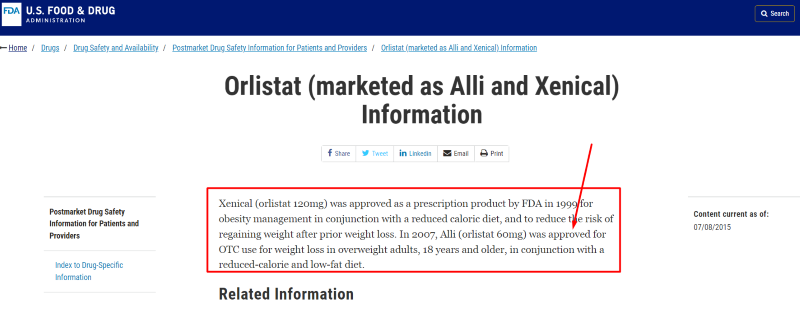What are Alli Weight Loss Pills?
Alli Weight Loss Pills are a brand of over-the-counter (OTC) weight loss medication that contains the active ingredient Orlistat.
Orlistat works by inhibiting the absorption of some dietary fat in the body, thereby reducing calorie intake and promoting weight loss.
Alli is designed to be used with a reduced-calorie, low-fat diet, and exercise program. The medication is available in capsule form and is intended for adults who are overweight or obese and looking to lose weight.
It is important to note that Alli may have side effects, including gastrointestinal symptoms such as oily stools, stomach pain, and diarrhea.
As with any medication, it is essential to consult a healthcare professional before using Alli.
How do Alli Weight Loss Pills work?
Alli Weight Loss Pills work by blocking the absorption of dietary fat in the body. The active ingredient in Alli is Orlistat, which inhibits the activity of an enzyme called lipase responsible for breaking down dietary fat.
By blocking lipase, Alli prevents the body from absorbing some of the fat consumed in meals. This means that some of the fat is passed out of the body through bowel movements rather than stored in the body as excess weight.
Alli is intended to be combined with a reduced-calorie, low-fat diet, and exercise program. When used correctly, Alli can aid in weight loss by reducing calorie intake and promoting healthy eating habits.
It is important to note that Alli is not a magic pill and should not be used as a substitute for a healthy lifestyle.
As with any medication, following the recommended dosage and consulting a healthcare professional before using Alli is important.
FDA Approved
Alli Weight Loss Pills is a medication approved by the US Food and Drug Administration (FDA) for treating obesity. Alli is a type of medication known as a lipase inhibitor, which works by blocking fat absorption in the body. This helps to reduce overall calorie intake and can lead to weight loss over time.

The active ingredient in Alli is orlistat, which has been shown to be effective in clinical studies for weight loss. When used as directed, Alli can help to promote weight loss by reducing the amount of fat absorbed by the body.
To be approved by the FDA, Alli underwent rigorous testing and clinical trials to ensure its safety and effectiveness. The medication has been shown to be safe and effective when used as directed, and it has been approved for over-the-counter use in the United States.
While Alli can be an effective tool for weight loss, it is essential to remember that it should be used as part of a comprehensive weight loss plan that includes a healthy diet and regular exercise. Alli is not a magic pill and should not be used as a substitute for healthy lifestyle habits.
It is also important to follow the recommended dosage and timing instructions for Alli to ensure maximum effectiveness and reduce the risk of side effects. Taking more than the recommended dosage of Alli is not recommended and may increase the risk of side effects, such as gastrointestinal symptoms.
Alli Weight Loss Pills are an FDA-approved medication that can be effective for weight loss when used as directed as part of a comprehensive weight loss plan.
If you are considering using Alli, it is essential to consult with a healthcare professional to determine if it is right for you.
Benefits of using Alli Weight Loss Pills
The benefits of using Alli Weight Loss Pills include weight loss and improved health outcomes.
When combined with a reduced-calorie, low-fat diet, and exercise program, Alli can help individuals lose more weight than they would through diet and exercise alone.
Studies have shown that Alli can lead to a modest weight loss of about 5% to 10% of body weight over six months, which can improve blood pressure, cholesterol levels, and other health markers.
In addition to weight loss, Alli can promote healthy eating habits by encouraging individuals to pay closer attention to the fat content of their meals.
Alli works by blocking the absorption of some dietary fat in the body, which means that individuals using the medication are more likely to choose low-fat foods and make healthier meal choices.
It is important to note that Alli is not a magic pill and should be part of a comprehensive weight loss plan that includes a healthy diet and regular exercise. Alli may have side effects, including gastrointestinal symptoms such as oily stools, stomach pain, and diarrhea.
As with any medication, it is essential to consult a healthcare professional before using Alli.
Risks and side effects of using Alli Weight Loss Pills
Alli Weight Loss Pills may have risks and side effects like any medication. Alli's most common side effects are gastrointestinal symptoms, including oily stools, stomach pain, and diarrhea.
These symptoms may occur due to the medication blocking the absorption of dietary fat in the body. Sometimes, these symptoms may be severe enough to cause individuals to discontinue using Alli.
Alli may also interfere with absorbing specific fat-soluble vitamins and other nutrients, such as vitamins A, D, E, K, and beta-carotene.
Individuals taking Alli are advised to take a multivitamin supplement containing these nutrients at least two hours before or after to prevent nutrient deficiencies.
There have also been rare reports of liver injury associated with Alli. However, it is essential to note that the risk of liver injury is low and that most individuals who use Alli do not experience serious side effects.
It is essential to consult with a healthcare professional before using Alli, especially if you have a history of gastrointestinal problems or liver disease. Alli should not be used by pregnant or breastfeeding women or individuals under 18.
Alli Weight Loss Pills: How to Use Them Effectively
Recommended dosage and timing
The recommended dosage for Alli Weight Loss Pills is one 60 mg capsule with each meal containing fat, up to three times daily. Alli should be taken within one hour of a meal that contains fat.
If a meal is missed or does not contain fat, a dose of Alli should be skipped.
It is essential to follow the recommended dosage and timing instructions for Alli to ensure maximum effectiveness and reduce the risk of side effects.
Taking more than the recommended dosage of Alli is not recommended and may increase the risk of side effects, such as gastrointestinal symptoms.
It is also important to note that Alli should be combined with a reduced-calorie, low-fat diet and exercise program to achieve optimal weight loss results. Alli is not a magic pill and should not be used as a substitute for healthy lifestyle habits.
If you have any questions or concerns about Alli's recommended dosage and timing, it is important to consult with a healthcare professional.
Best practices for taking Alli Weight Loss Pills
Here are some best practices to follow when taking Alli Weight Loss Pills:
- Follow the recommended dosage: Take one 60 mg capsule with each meal containing fat up to three times daily. Do not exceed the recommended dosage.
- Take Alli with a meal: Alli should be taken within one hour of a meal that contains fat. If a meal is missed or does not contain fat, a dose of Alli should be skipped.
- Follow a reduced-calorie, low-fat diet: Alli is most effective when combined with a healthy diet that is low in fat and calories. Avoid high-fat meals or snacks while taking Alli.
- Exercise regularly: Regular exercise can help to increase weight loss and improve overall health. Aim for at least 30 minutes of moderate exercise per day.
- Take a multivitamin: Alli may interfere with specific vitamins and nutrient absorption. To prevent nutrient deficiencies, take a multivitamin containing vitamins A, D, E, K, and beta-carotene at least two hours before or after Alli.
- Stay hydrated: Drinking plenty of water can help to prevent dehydration and constipation, which may be the side effects of taking Alli.
- Monitor for side effects: Alli may cause gastrointestinal symptoms, such as oily stools, stomach pain, and diarrhea. If you experience any side effects, consult with a healthcare professional.
- Consult with a healthcare professional: If you have any questions or concerns about taking Alli, it is essential to consult with a healthcare professional before starting to use the medication.
Tips for incorporating Alli into your weight loss plan
Here are some tips for incorporating Alli into your weight loss plan:
- Create a meal plan: Alli is most effective with a reduced-calorie, low-fat diet. Create a meal plan focusing on lean protein, vegetables, fruits, and whole grains, and avoid high-fat foods.
- Use a food diary: Keeping track of what you eat can help you stay on track with your weight loss goals and identify areas where you may need to make changes.
- Exercise regularly: Regular exercise can help to increase weight loss and improve overall health. Incorporate both cardio and strength training into your exercise routine.
- Take Alli with meals: Alli should be taken with a fat meal. This helps the medication block the absorption of fat in the body.
- Take a multivitamin: Alli may interfere with specific vitamins and nutrient absorption. Taking a multivitamin can help to prevent nutrient deficiencies.
- Stay hydrated: Drinking plenty of water can help to prevent dehydration and constipation, which may be the side effects of taking Alli.
- Monitor for side effects: Alli may cause gastrointestinal symptoms, such as oily stools, stomach pain, and diarrhea. If you experience any side effects, consult with a healthcare professional.
- Set realistic goals: Losing weight takes time and effort. Set realistic goals for yourself and celebrate small successes along the way.
- Seek support: A support system can help you stay motivated and accountable. Consider joining a weight loss group or working with a healthcare professional to create a personalized weight loss plan.
Remember, Alli is not a magic pill and should be part of a comprehensive weight loss plan that includes a healthy diet and regular exercise.












